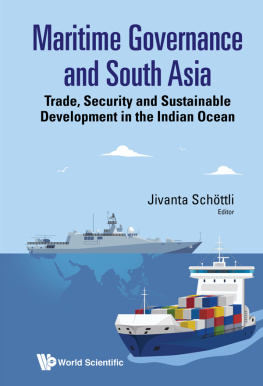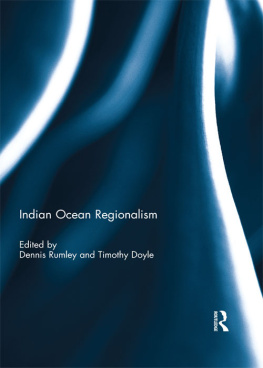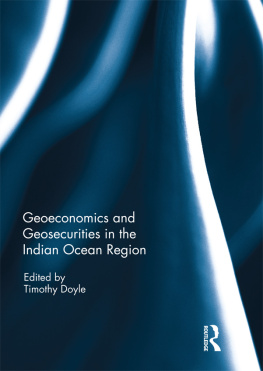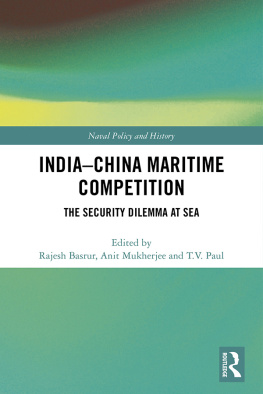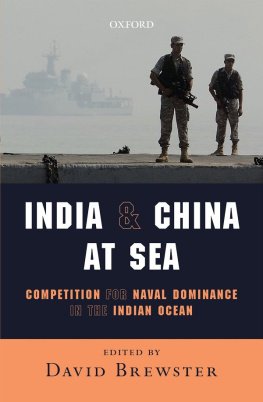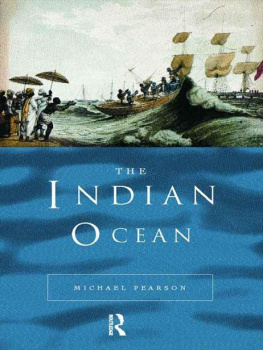Power, Politics and Maritime Governance in the Indian Ocean
The Indian Ocean is of tremendous geo-political and strategic relevance. More than eighty per cent of global seaborne trade in oil passes through the Ocean. Access to resources is under-regulated (fishing) or has yet to be conceived (deep seabed mining) and security concerns such as piracy and the stability of strategically located states, are propelling countries to rethink naval capabilities and priorities. This applies to littoral countries as well as to extra-regional powers such as China, Japan, European countries and the United States, each of which is keenly interested in maintaining and securing open sea-lanes of communication. The revival in maritime concern is prompting new dynamics of competition and cooperation in a region that has historically been characterised by dense cultural, economic and political networks. The Indian Ocean is an extensive and expansive space where no one power has been able to hold sway. Hence, multilateralism and open regionalism are key contributors to stability, both in terms of military as well as commercial coordination. In this volume, scholars from Asia, Europe and the US examine institutions and examples of maritime governance within the Indian Ocean including security arrangements, evolving forms of alliance building and counter-balancing, policy planning and forecasting.
This book was originally published as a special issue of the Journal of the Indian Ocean Region.
Jivanta Schttli is a postdoctoral scholar at the Research Centre for Globalisation and Distributional Conflict and associate member of the South Asia Institute, both at Heidelberg University, Germany. Her research interests include Indias international relations and policy-making that is framed by the constraints and contingencies of domestic politics and global dynamics.
Power, Politics and Maritime Governance in the Indian Ocean
Edited by
Jivanta Schttli
First published 2015
by Routledge
2 Park Square, Milton Park, Abingdon, Oxon, OX14 4RN, UK
and by Routledge
711 Third Avenue, New York, NY 10017, USA
Routledge is an imprint of the Taylor & Francis Group, an informa business
2015 Indian Ocean Research Group
All rights reserved. No part of this book may be reprinted or reproduced or utilised in any form or by any electronic, mechanical, or other means, now known or hereafter invented, including photocopying and recording, or in any information storage or retrieval system, without permission in writing from the publishers.
Trademark notice: Product or corporate names may be trademarks or registered trademarks, and are used only for identification and explanation without intent to infringe.
British Library Cataloguing in Publication Data
A catalogue record for this book is available from the British Library
ISBN 13: 978-1-138-82887-2
ePub eISBN 13: 978-1-317-57244-2
Mobipocket/Kindle eISBN 13: 978-1-317-57243-5
Typeset in Times New Roman
by RefineCatch Limited, Bungay, Suffolk
Publishers Note
The publisher accepts responsibility for any inconsistencies that may have arisen during the conversion of this book from journal articles to book chapters, namely the possible inclusion of journal terminology.
Disclaimer
Every effort has been made to contact copyright holders for their permission to reprint material in this book. The publishers would be grateful to hear from any copyright holder who is not here acknowledged and will undertake to rectify any errors or omissions in future editions of this book.
Contents
Jivanta Schttli
Christian Wagner
Krishnappa Venkatshamy
Jonathan Holslag
Isabelle Saint-Mzard
James Rogers
Toshi Yoshihara
Peter Lehr
The chapters in this book were originally published in the Journal of the Indian Ocean Region, volume 9, no. 1 (June 2013). When citing this material, please use the original page numbering for each article, as follows:
Chapter 1
Editorial: Power, politics and maritime governance in the Indian Ocean
Jivanta Schttli
Journal of the Indian Ocean Region, volume 9, no. 1 (June 2013) pp. 15
Chapter 2
The Indian Ocean Rim Association for Regional Co-operation (IORARC): the futile quest for regionalism?
Christian Wagner
Journal of the Indian Ocean Region, volume 9, no. 1 (June 2013) pp. 616
Chapter 3
The Indian Ocean Region in Indias strategic futures: looking out to 2030
Krishnappa Venkatshamy
Journal of the Indian Ocean Region, volume 9, no. 1 (June 2013) pp. 1741
Chapter 4
The reluctant pretender: Chinas evolving presence in the Indian Ocean
Jonathan Holslag
Journal of the Indian Ocean Region, volume 9, no. 1 (June 2013) pp. 4252
Chapter 5
The French strategic vision of the Indian Ocean
Isabelle Saint-Mzard
Journal of the Indian Ocean Region, volume 9, no. 1 (June 2013) pp. 5368
Chapter 6
European (British and French) geostrategy in the IndoPacific
James Rogers
Journal of the Indian Ocean Region, volume 9, no. 1 (June 2013) pp. 6989
Chapter 7
The US Navys IndoPacific challenge
Toshi Yoshihara
Journal of the Indian Ocean Region, volume 9, no. 1 (June 2013) pp. 90103
Chapter 8
Piracy and maritime governance in the Indian Ocean
Peter Lehr
Journal of the Indian Ocean Region, volume 9, no. 1 (June 2013) pp. 104119
Please direct any queries you may have about the citations to
clsuk.permissions@cengage.com
We would like to acknowledge the funding of the Australian Research Council Discovery Project DP120101166: Building an Indian Ocean Region for their generous assistance in the conduct and completion of this book.
The compilation of papers for this special issue arose out of a two-day, international symposium that took place in Heidelberg, Germany during the summer of 2012. The occasion was made possible thanks to the Hengstberger Prize 2011 and the Internationale Wissenschaftsforum Heidelberg (IWH). Additional support was granted by the Cluster of Excellence, Asia and Europe in a Global Context and the South Asia Institute, both located at Heidelberg University.
Bringing together a set of specialists in security dynamics, politics and history, the presentations drew from a variety of sources and perspectives including expert interviews and archival material, tracing the movement of nineteenth century luxury goods within the Indian Ocean to analysing the latest developments in nuclear submarines. Each however, engaged with the general question of how to explore, identify and investigate empirical manifestations of maritime governance within the Indian Ocean. Defined, at its minimum, as regulated, repeated, consensus-driven interactions, governance provided the common platform for this vibrant symposium.
In the papers that follow, a spectrum of view are provided, focusing on key actors, dynamics and the processes of interaction within the Indian Ocean arena. Christian Wagner examines the contributions and tribulations of the Indian Ocean Rim Association for Regional Cooperation (IORARC) arguing that it might be more useful to think of this institution as an international rather than a regional organisation. Turning to the role of India in the Indian Ocean arena, Krishnappa Venkatshamy provides an exhaustive survey of the impulses behind Indias security strategy thinking.


